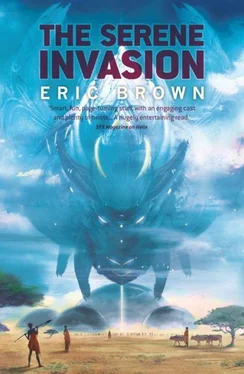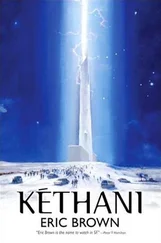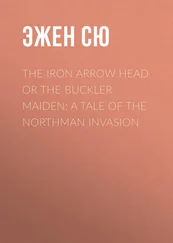Then Prakesh, a friend a year older than Ana, had dragged her along to platform fourteen and pointed down at the silver tracks. There, crushed flat and the enamel shattered, was a cup just like Bilal’s. She’d jumped down, despite the danger, and retrieved it. On its flattened underside was the letter B that Bilal had scratched to make the cup his very own.
But Ana had refused to believe that Bilal had gone the same way as his cup, squashed beneath the merciless wheels of a train, because there was no blood on the oil-stained gravel between the timber ties, and when she asked a friendly chai-wallah if a street kid’s body had been found that morning, he had shaken his head and told her no, only the bodies of a station monkey and a dozen rats.
So what had happened to her brother?
Ten years ago now… and Ana recalled the sense of desolation, of disbelief and loneliness, as if it had been just yesterday.
For years she had thought that one day he would return, fabulously wealthy, and whisk her away from a life of begging and stealing. And even now, at the age of sixteen, she still harboured a tiny hope that this might be so. But sometimes she gave in to despair, and wondered what kind of death her brother might have met.
She heard a sound behind her and turned quickly to throw the banana skin at the approaching monkey — but it was not a monkey, or at least not a furry monkey. Prakesh, whose protruding ears gave him the appearance of a little wise ape, swung onto the girder and hunkered down beside her.
“Station Master Jangar has just said the word, get out!” he reported, staring at her with alarmed eyes.
Ana produced a gob-full of spit and dropped it onto the tracks below. Dead shot! It hit the silver rail and sizzled in the midday sun.
She shrugged. “So, the bastard is always saying get out. That’s his job.”
“No, this time he means it. Lila and Sara and Bijay have left for the park, and Gupta and Sanjay are packing up.”
Ana smiled to herself. Gupta and Sanjay, miniature businessmen in the making, had a shoe-shine box between them, a possession that legitimised their presence on the station, if only to themselves. It made no difference to Station Master Jangar when the word came down from the politicians to clean up the station.
“So if everyone goes, leaving only me, then they won’t think I’m a street kid, will they? They’ll overlook me and I’ll just stay where I am, resting in the sun…” She stretched out her short length along the girder, placing her hands behind her head, then squinting up at Prakesh with one eye.
He looked alarmed — his default expression — at both Ana’s reckless posture on the girder twenty metres above the rails, and at her defiance of Jangar’s wishes.
“But Ana, he said that Sanjeev and his thugs are on their way! And you know what that means!”
His small hands were on her now, trying to tug her into a sitting position. Reluctantly she sat up, for mention of Sanjeev sent a cold jolt of dread down her spine.
Sanjeev was a fat thug and a bugger. He liked to corner boys and girls, smother them into submission with his great rolls of flab, then shove his greased and tiny tool up their bottoms. Those who protested too loudly he strangled and had his cohorts leave the bodies on the tracks for the trains to mangle in the night. If you bore the buggering in silence, you might live. Ana had survived a night with fat Sanjeev, thanked Kali that his cock was the size of a chilli pepper, and vowed never to be caught again.
“When are they coming?” she asked.
“Now!”
She scanned the length of the platform. “Where are they?”
Prakesh shook his head. “They started in the goods yard, moving west. I don’t know where they might be now.”
“Ah-cha, Prakesh. Let’s get out of here, let’s ‘don our masks and fly with the night!’”
Prakesh grinned. He couldn’t read, like so many of the other kids, so Ana often read to them from her comics. Her favourite strip was Superhero Salam and the Warriors of Dawn, who helped the poor and fought the rich and corrupt.
They mimed donning invisible masks, stood up and walked wobblingly along the girder to the timber signal box. From the underside of the footbridge they scrambled onto the sloping, slipping tiles of the box, crawled along the gutter, and shinned down the drainpipe.
They were on platform ten, in the very centre of the station, and from here they had to make their way to platform one and the unofficial exit in the fence.
They set off, zigzagging between commuters, earning curses from some and swipes from others. Ana just ducked and laughed and, a safe distance away, turned and pulled a disgusting face.
They raced up the steps and along the footbridge where, just a minute ago, they had concealed themselves from view. Two minutes now and they would be away from the station and across the Hoogli bridge to Maidan Park, a fine place to play cricket and watch the rich kids fly their kites, but nothing like the station for begging, stealing or finding a safe, warm place to spend the night.
They came to the end of the footbridge. Stairs descended to their right and left. They turned right, but Prakesh halted her headlong descent. “Stop! Look, Ana…”
The crowds on the steps were thinning now and Ana saw, staring up at them, the thin sly face of Kevi Nan, Sanjeev’s one-armed minion. He let out a piercing cry and darted up the stairway. Ana and Prakesh turned and ran down the flight of steps at their backs.
Ana stopped. Ascending the steps, pushing roughly through the commuters, was another of Sanjeev’s greasy henchmen.
She grabbed Prakesh and they ran back up the steps, turned left and raced along the footbridge.
She was accustomed to running. Every day someone tried to catch her, arrest her, or chase her away. She was adept at flight — but usually there were only one or two people in pursuit. Now, it seemed, Sanjeev had mobilised his entire street army of pimps, crooks and hangers-on. She heard more than one cry from behind her, and from the stairways ascending to the walkway.
Ana found Prakesh’s hand and pulled him close as they ran. “I know where to go. Follow me! They won’t dare to come after us!”
The footbridge was enclosed in a shell of grey corrugated metal, the rectangular panels riveted together. Here and there the rivets had loosened, or been forced, and the corrugated panels flapped. Directly above platform three, Ana knew, there was a gap in the metal.
She dragged Prakesh through the crowd until they reached the metal cladding and ran along until they came to the vertical gap, little more than a slit between the panels. In one swift movement she knelt and forced the panel outwards, revealing a gap that gave onto a supporting girder.
“Follow me!” she said, and slipped through.
She was out on the girder high above platform three, standing with her back to the drop and gripping a perspex window ledge to stop herself from tumbling backwards.
Prakesh squirmed after her, grimacing as his t-shirt was snagged on a loose rivet. He pulled himself through, tearing his shirt and almost falling forward.
Ana reached down and steadied him. Wide-eyed with fear, he stood with his back to the drop and edged towards her.
“This way,” she said, and stride by sideways stride made her way along the length of the footbridge.
Once before she had evaded a policeman this way, and her escape had become a legend among the kids of the station. The cop, a stick-thin youngster, had managed to squeeze through the gap in pursuit and follow her along the outside of the footbridge. He had gained on her, but he had reckoned without Ana’s daring. They had been directly above platform two, with the train just leaving the station, and Ana had waited until the very last carriage was directly underneath. Then she jumped the three metres to its cambered roof, landed with a jarring impact and lay face-down and trembling as the train flashed beneath the bridge and away from the station, carrying her to safety. She had jumped from the train at its first stop and caught a night train back to Howrah and to a hero’s welcome from her street kid family.
Читать дальше












